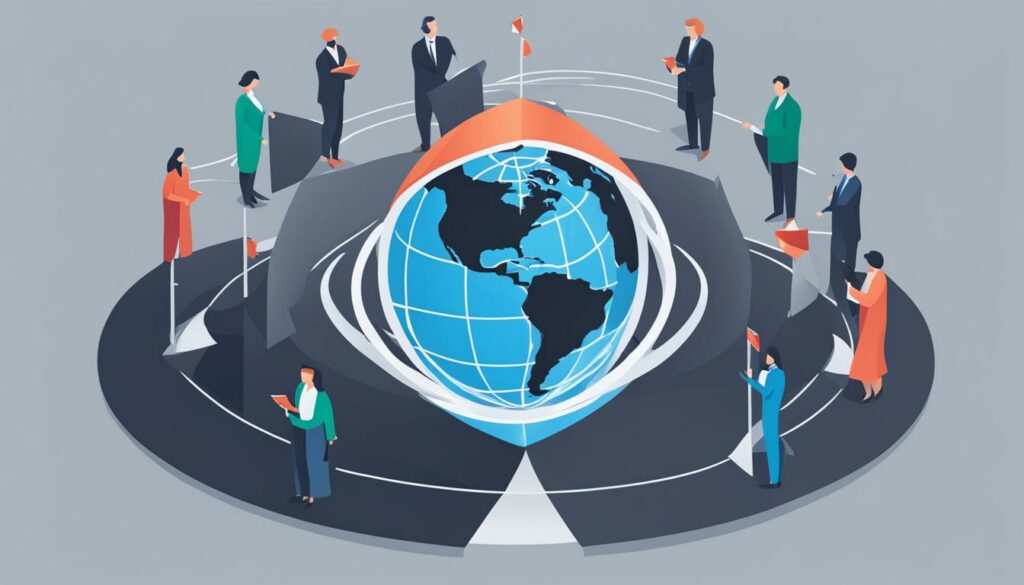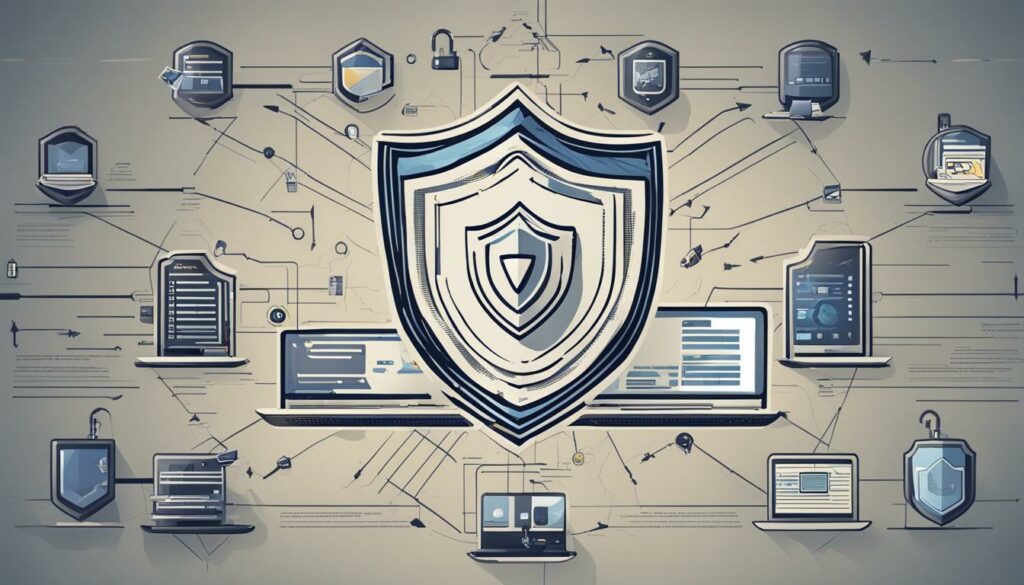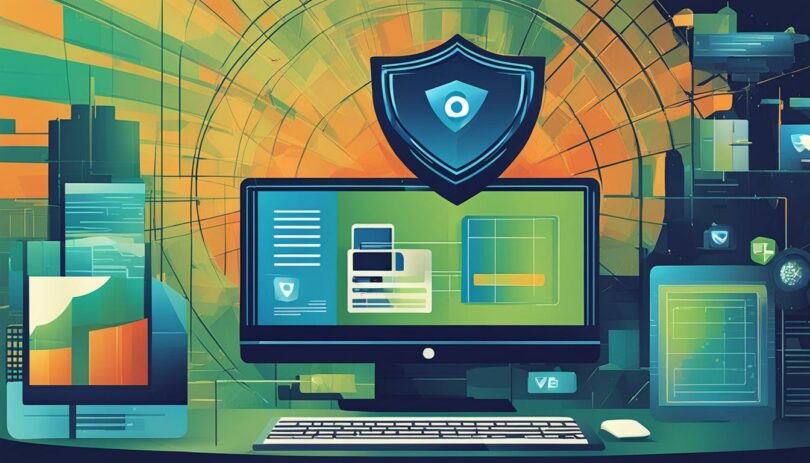A VPN, which stands for “Virtual Private Network,” is a technology that allows users to establish a secure network connection when using public networks. It encrypts internet traffic and disguises the user’s online identity, making it difficult for third parties to track their activities and steal data. VPNs work by redirecting internet traffic through a remote server operated by a VPN host, hiding the user’s IP address and protecting their data from external access. The benefits of using a VPN connection include secure encryption, disguising one’s whereabouts, accessing regional content, and ensuring secure data transfer.
Key Takeaways:
- A VPN, or Virtual Private Network, is a technology that provides a secure and private network connection.
- VPNs encrypt internet traffic and hide the user’s IP address, protecting their privacy and security.
- Using a VPN allows users to access region-restricted content and secure their data on public networks.
- VPNs are essential for safeguarding online privacy and ensuring secure data transfer.
- When choosing a VPN, consider factors such as reputation, server locations, and privacy policy.
How does a VPN work?
A VPN works by routing a device’s internet connection through a remote server network operated by a VPN service. This creates a secure tunnel for all data transmitted between the device and the internet. The VPN server becomes the source of the data, hiding the user’s actual IP address and making it difficult for ISPs and other third parties to track their online activities. The data is encrypted in real-time, ensuring that even if someone were to intercept it, it would be unreadable. VPNs use various encryption protocols and methods to protect the user’s traffic, ensuring that their data remains private and secure.
One of the core components of a VPN is encryption. When data is sent from a device through a VPN connection, it is encrypted using complex algorithms that scramble the data and make it unreadable to anyone without the encryption key. This ensures that even if someone were to intercept the data, they would not be able to decipher its contents. The encryption process happens in real-time, ensuring that all data transmitted through the VPN is protected.
In addition to encryption, a VPN also utilizes a network of servers to route internet traffic. When a user connects to a VPN, their data is sent through a remote server located in a different geographic location. This server acts as an intermediary between the user and the websites or services they are accessing. By routing internet traffic through a remote server, the user’s actual IP address is masked, further enhancing their online privacy and anonymity.
VPN Traffic and Data Protection
All internet traffic transmitted through a VPN is secured and protected. This includes everything from web browsing and file downloads to streaming videos and online gaming. The VPN encrypts all of this data, ensuring that it remains private and secure. By encrypting data, VPNs protect users from potential threats such as hackers, ISPs monitoring internet activities, or even government surveillance. It also prevents data leaks and unauthorized access to sensitive information. This level of protection is particularly important when using public Wi-Fi networks, as they are often targeted by cybercriminals looking to intercept data.
| Without VPN | With VPN | |
|---|---|---|
| IP Address | Visible to ISP and websites | Hidden behind VPN server |
| Data Encryption | Unencrypted and vulnerable | Encrypted and secure |
| Online Privacy | Risk of tracking and monitoring | Enhanced privacy and anonymity |
Benefits of Using a VPN Connection
A VPN connection offers numerous benefits that enhance privacy, security, and online anonymity. By understanding the advantages of using a VPN, individuals can make informed decisions about protecting their digital identities and safeguarding their data.
Enhanced Privacy:
One of the key benefits of a VPN is enhanced privacy. When connected to a VPN, all internet traffic is encrypted, making it extremely difficult for hackers, ISPs, and other third parties to monitor or track online activities. The VPN masks the user’s IP address, effectively hiding their identity and making it challenging to trace their online presence. This increased privacy is particularly important when accessing public Wi-Fi networks, as it prevents potential attackers from intercepting sensitive information.
Heightened Security:
Another significant advantage of using a VPN is the heightened security it provides. All data transmitted through a VPN connection is encrypted, ensuring that it remains secure and protected from unauthorized access. This is especially crucial when sharing sensitive information, such as banking details or personal data. By utilizing a VPN, users can have peace of mind that their information is safe from potential threats and cyberattacks.
Online Anonymity:
A VPN also offers the benefit of online anonymity. With a VPN, users can browse the internet without revealing their actual location or identity. This can be particularly useful for those who wish to access content or websites that are region-restricted. By connecting to a VPN server in a different location, users can bypass geographical restrictions and access content that may otherwise be unavailable to them.
Overall, the benefits of using a VPN connection include enhanced privacy, heightened security, and the ability to maintain online anonymity. By encrypting internet traffic and hiding the user’s IP address, VPNs offer a valuable layer of protection in today’s digital landscape.

Why should you use a VPN connection?
Using a VPN connection is essential for maintaining your online privacy and security. Whether you’re browsing the internet, accessing public Wi-Fi networks, or conducting sensitive transactions, a VPN provides an extra layer of protection that keeps your data safe from prying eyes.
One of the primary reasons to use a VPN is to safeguard your privacy. Without a VPN, your internet service provider (ISP) can track your online activities and potentially share that information with advertisers, law enforcement, or other third parties. By encrypting your internet traffic and hiding your IP address, a VPN prevents anyone from tracing your online footsteps.
Using a VPN is particularly important when connecting to public Wi-Fi networks. These networks are often insecure, making it easy for hackers to intercept your data. With a VPN, all of your information is encrypted, ensuring that even if someone manages to intercept it, they won’t be able to decipher its contents.
“Using a VPN is like having a digital bodyguard that protects you from online threats and keeps your data secure.”
In addition to privacy and security, a VPN also allows you to access geo-restricted content. By connecting to a server in a different country, you can bypass censorship and access websites and streaming services that may be blocked in your location. This feature is especially useful when traveling or living in countries with strict internet regulations.
To sum up, using a VPN is crucial for protecting your online privacy, securing your data, and bypassing restrictions. It keeps your information safe from prying eyes, provides a secure connection on public networks, and allows you to access content from around the world. With the increasing prevalence of online threats and privacy concerns, a VPN is a must-have tool for anyone who values their digital security.
What Should a Good VPN Do?
A good VPN should possess certain features and qualities to ensure optimal privacy, security, and functionality. These essential components contribute to a reliable and trustworthy VPN service:
- Encryption: A high-quality VPN should utilize strong encryption algorithms to protect users’ data and communications. Robust encryption ensures that information is encoded and unreadable to unauthorized parties, safeguarding sensitive data from potential interception or exploitation.
- Kill Switch: A VPN kill switch is a crucial feature that automatically terminates the internet connection if the VPN connection drops unexpectedly. This prevents any unprotected data from being transmitted, ensuring that the user’s online activities remain secure and private at all times.
- Two-Factor Authentication: Providing an additional layer of security, two-factor authentication adds an extra step for user verification before granting access to the VPN. This feature significantly enhances the protection of user accounts, mitigating the risk of unauthorized access and potential data breaches.
Combining these features, a good VPN ensures that user data remains encrypted, connections stay secure, and unauthorized access is prevented. By prioritizing privacy, security, and ease of use, a reliable VPN service offers users peace of mind and a safer online experience.
“A good VPN should prioritize encryption, offer a kill switch feature to prevent data leakage, and incorporate two-factor authentication for added security.”
Let’s take a closer look at these features:
| Feature | Description |
|---|---|
| Encryption | A good VPN should utilize strong encryption algorithms to protect user data from unauthorized access. |
| Kill Switch | A kill switch feature automatically terminates selected programs or connections if the VPN connection is suddenly interrupted, preventing data leakage. |
| Two-Factor Authentication | This feature adds an additional layer of security by requiring multiple forms of authentication before granting access to the VPN. |
These features collectively contribute to the overall effectiveness and reliability of a VPN, ensuring that user privacy and security are prioritized.

The History of VPNs
Virtual Private Networks (VPNs) have a rich history that dates back to the 1960s. Originally developed by the US Department of Defense to encrypt internet communication data, VPNs have come a long way in ensuring secure network connections. In the early years, VPNs were primarily used by companies for remote access to their internal networks. However, as concerns about internet privacy and security grew, VPNs became increasingly popular among consumers.
Throughout the development of VPN technology, various protocols and encryption methods were created to establish secure connections. These early VPNs paved the way for the modern VPNs we know today. By redirecting internet traffic through remote servers, VPNs encrypt data and protect users’ online identities, making it difficult for third parties to track their activities or steal their data. VPNs offer an additional layer of security and privacy, making them an essential tool for anyone concerned about their online presence.
As concerns about internet privacy and security grew, VPNs became increasingly popular among consumers.
Today, VPNs are widely used for both personal and business purposes. They offer a secure and private internet browsing experience, allowing users to access region-restricted content, protect their data on public Wi-Fi networks, and safeguard against cyber threats. With a reliable VPN provider and proper setup, individuals and organizations can enjoy the benefits of enhanced privacy, security, and anonymity while browsing the internet.
The Early Years of VPNs
In the early years, VPNs were primarily used by companies and organizations to establish secure connections for remote access to their internal networks. This allowed employees to access company resources and sensitive information from anywhere, ensuring productivity and convenience. VPNs provided a way to connect remote offices and employees, making it easier to collaborate and share data without compromising security.
VPN Development and Predecessors
The development of VPN technology was driven by the need for secure and private internet communication. VPNs were built upon the foundation laid by encryption protocols and methods, including IPsec (Internet Protocol Security), PPTP (Point-to-Point Tunneling Protocol), and L2TP (Layer 2 Tunneling Protocol). These protocols, along with others like SSL/TLS, played a significant role in the early development of VPNs and continue to be used today.
The Future of VPNs
As internet privacy concerns and cyber threats continue to evolve, the demand for VPN services is expected to grow. VPN providers are constantly improving their technologies to offer more advanced encryption methods, faster connection speeds, and greater convenience for users. With the increasing reliance on internet-connected devices and the growing importance of online privacy, VPNs are likely to remain an essential tool for protecting personal and business data in the future.
Different types of VPNs
When it comes to VPNs, there are several different types available, each catering to specific needs and requirements. Understanding the different types will help you choose the best VPN solution for your specific situation. The three most common types of VPNs are SSL VPN, site-to-site VPN, and client-to-server VPN.
SSL VPN
An SSL VPN, or Secure Socket Layer Virtual Private Network, is commonly used by companies to provide remote access to employees using their personal devices. It operates through a web browser and uses SSL/TLS encryption to secure the connection between the user’s device and the VPN server. This type of VPN is ideal for employees who need to access company resources from outside the office.
Site-to-Site VPN
A site-to-site VPN establishes secure connections between multiple locations within an organization. It allows users on different networks to access resources on other networks securely. This type of VPN is commonly used in large organizations with multiple branches or offices. Site-to-site VPNs provide secure and encrypted communication between all connected locations.
Client-to-Server VPN
Client-to-server VPNs, also known as remote access VPNs, are used to connect individual devices to a VPN server. This type of VPN provides secure access to the internet and protects data transmission. It is commonly used by individuals who want to enhance their online privacy and security while browsing the internet.
Each type of VPN offers different features and benefits, so it’s important to consider your specific needs before choosing the right one for you. Whether you need remote access to your company’s resources, secure communication between multiple locations, or individual protection and privacy, there is a VPN solution to meet your requirements.
| Type of VPN | Common Use | Encryption |
|---|---|---|
| SSL VPN | Remote access for employees | SSL/TLS encryption |
| Site-to-Site VPN | Secure communication between multiple locations | Various encryption protocols |
| Client-to-Server VPN | Individual protection and privacy | Various encryption protocols |
Is a VPN safe to use?
Using a VPN is generally safe, especially when you choose a reliable and reputable VPN provider. However, it is crucial to exercise caution and avoid using unreliable or free VPN services, as they may compromise your safety and security online. Reputable VPN providers prioritize user privacy and have transparent privacy policies, ensuring that your data and online activities remain protected.
When using a VPN, your internet traffic is encrypted, making it difficult for hackers and cybercriminals to intercept and access your data. Your IP address is also hidden, adding an extra layer of anonymity and protection. However, it is important to note that while a VPN can protect your privacy and secure your connection, it does not protect against malware or phishing attacks. Therefore, it is advisable to use a VPN in conjunction with other cybersecurity measures, such as antivirus software, to ensure comprehensive online security.
“Using a reliable VPN can significantly enhance your online safety and privacy. However, it is essential to be cautious and choose a reputable VPN provider that prioritizes user privacy and security.”
The Importance of Choosing a Reliable VPN
When selecting a VPN provider, it is crucial to consider factors such as reputation, encryption protocols, server locations, and privacy policy. A reliable VPN provider will have a proven track record of protecting user data and will use robust encryption protocols to ensure the confidentiality of your internet traffic. Additionally, they will have a clear and transparent privacy policy, stating how they handle user data and whether they keep any logs.
By choosing a reliable VPN, you can have peace of mind knowing that your online activities are protected and your data remains secure. A trustworthy VPN provider will prioritize your privacy and work tirelessly to ensure that your online experience is safe and anonymous.
| VPN Safety Factors | Considerations |
|---|---|
| Reputation | Choose a reputable VPN provider with positive user reviews and a proven track record of protecting user privacy. |
| Encryption Protocols | Ensure that the VPN provider uses strong and secure encryption protocols to safeguard your internet traffic. |
| Server Locations | Check if the VPN provider has servers in your desired locations to ensure optimal browsing speeds and access to region-restricted content. |
| Privacy Policy | Review the VPN provider’s privacy policy to understand how they handle user data and whether they keep any logs. |
By considering these factors and choosing a reliable VPN provider, you can enjoy safe and secure internet browsing, protect your privacy, and have peace of mind knowing that your data is in good hands.

Choosing and Setting Up a VPN
When it comes to choosing a VPN, there are several factors to consider. One of the first things to look for is a reputable VPN provider with a solid track record. Take the time to research different providers and read reviews from trusted sources to ensure you select a reliable option.
Price is another important consideration. VPN services are typically subscription-based, so compare pricing plans and features to find the best value for your needs. Some VPNs offer free versions, but be cautious as these may have limitations or compromise your privacy.
Additionally, consider the provider’s server locations. The more server locations available, the more options you’ll have for connecting to different regions and accessing region-restricted content.
Setting up a VPN is generally straightforward. Most VPN providers offer client software that you can download and install on your device. The setup process may vary slightly depending on the provider, but it typically involves running the installation file and following the prompts. Once installed, you can configure the VPN settings to your preferences, such as selecting a server location or enabling additional security features.
Conclusion
Using a VPN is of utmost importance for anyone seeking to enhance their online privacy, security, and anonymity. By encrypting internet traffic and hiding the user’s IP address, VPNs provide a secure connection that makes it incredibly difficult for third parties to track user activities or steal valuable data. The benefits of employing a VPN are numerous, ranging from accessing region-restricted content to protecting personal data while using public Wi-Fi networks. Therefore, it is highly recommended to integrate a reliable VPN into your online browsing routine to ensure a safer and more secure experience.
In summary, the importance of a VPN lies in its ability to safeguard your digital presence and keep your information out of the hands of cybercriminals. By choosing a reputable VPN provider and configuring the VPN settings to your preferences, you can enjoy the benefits of encrypted internet traffic and anonymous online browsing. While a VPN is not a foolproof solution and should be used in conjunction with other cybersecurity measures, it significantly strengthens your online privacy and security.
To conclude, if you value your privacy and want to protect your personal information from prying eyes, using a VPN is highly recommended. It not only encrypts your data but also provides a secure connection that shields you from potential cyber threats. Whether you are accessing the internet at home or on the go, a VPN is a valuable tool that ensures your online activities remain private and your personal information remains secure.
FAQ
What does VPN stand for?
VPN stands for Virtual Private Network.
How does a VPN work?
A VPN works by encrypting internet traffic and redirecting it through a remote server operated by a VPN host. This hides the user’s IP address and protects their data from external access.
What are the benefits of using a VPN connection?
Using a VPN connection offers benefits such as secure encryption, disguising one’s whereabouts, accessing regional content, and ensuring secure data transfer.
Why should you use a VPN connection?
Using a VPN connection is important for safeguarding online privacy and security, especially when using public Wi-Fi networks or preventing ISPs from tracking online activities.
What should a good VPN do?
A good VPN should encrypt the user’s IP address and all data transmitted through the connection, have a kill switch feature, and offer two-factor authentication for enhanced security.
What is the history of VPNs?
VPN technology dates back to the 1960s when the US Department of Defense worked on encrypting internet communication data. Over the years, VPNs gained popularity among consumers for privacy and security concerns.
What are the different types of VPNs?
Different types of VPNs include SSL VPNs, site-to-site VPNs, and client-to-server VPNs, each serving specific purposes for remote access or secure connections.
Is a VPN safe to use?
Using a reputable VPN provider ensures safety, but caution should be exercised when using unreliable or free VPN services that may track user data or have security vulnerabilities.
How do I choose and set up a VPN?
When choosing a VPN, factors such as price, reputation, server locations, and privacy policy should be considered. Setting up a VPN typically involves installing the VPN client software provided by the chosen VPN service.






